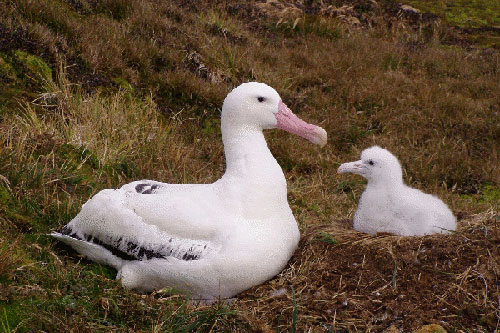
An elderly male Wandering Albatross Diomedea exulans and chick, near Prinsloomeer on Marion Island, photograph by John Cooper
Vonica Perold (FitzPatrick Institute of African Ornithology, University of Cape Town, South Africa) and colleagues have published in the Marine Pollution Bulletin on plastic ingested by albatrosses and giant petrels at sub-Antarctic Marion Island. Fishery-related litter decreased with reduced local fishing effort, but non-fishery litter items increased between 1996 and 2018.
The paper’s abstract follows:
“Plastic ingestion by seabirds is an efficient way to monitor marine plastics. We report temporal variation in the characteristics of marine litter regurgitated by albatrosses and giant petrels on sub-Antarctic Marion Island between 1996 and 2018. Both fishery and other litter peaked during the height of the Patagonian toothfish fishery around the island (1997–1999). Comparing the two subsequent decades of reduced fishing effort (1999–2008 and 2009–2018), fishing litter decreased while other litter increased across all species. Litter increased most in grey-headed albatrosses, followed by giant petrels and wandering albatrosses. Similar ranked responses were found in the same species at South Georgia, but non-fishery-related litter has increased faster in the Indian Ocean than the southwest Atlantic, indicating regional changes in litter growth rates. These seabirds' regurgitations provide an easy, non-invasive way to track changes in oceanic litter in a remote area that is otherwise difficult to monitor.”
Reference:
Perold, V., Schoombie, S. & Ryan, P.G. 2020. Decadal changes in plastic litter regurgitated by albatrosses and giant petrels at sub-Antarctic Marion Island. Marine Pollution Bulletin 159. doi.org/10.1016/j.marpolbul.2020.111471.
John Cooper, ACAP Information Officer, 14 August 2020

 English
English  Français
Français  Español
Español